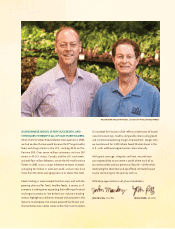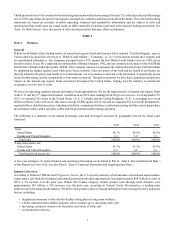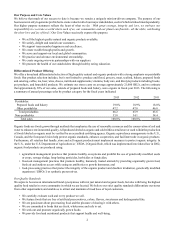Whole Foods 2013 Annual Report Download - page 16
Download and view the complete annual report
Please find page 16 of the 2013 Whole Foods annual report below. You can navigate through the pages in the report by either clicking on the pages listed below, or by using the keyword search tool below to find specific information within the annual report.7
Team members are involved at all levels of our business. We strive to create a company-wide consciousness of “shared fate” by
uniting the interests of team members as closely as possible with those of our shareholders. One way we reinforce this concept
is through our Gainsharing program. Under Gainsharing, as part of our annual planning process, each team receives a labor
budget expressed as a percentage of their team’s sales, with leverage built into the budgets on an overall company basis. When
teams come in under budget due either to higher sales or lower labor costs, a portion of the surplus is divided among the team
members and paid out every four weeks, and a portion is set aside in a savings pool. When teams are over budget (or in a labor
deficit position), no Gainsharing money is paid out. Instead, the overage is taken out of the team’s savings pool or, in the absence
of savings, paid back using future surpluses. The savings pool is paid out annually after the end of the fiscal year to all teams
with a positive balance. Rewarding our team members for increases in labor productivity, something they can control, gives
them a direct stake in the success of our business. We also encourage stock ownership among team members through our broad-
based team member stock option plan, stock purchase plan and 401(k) plan.
Team Members
We created more than 5,600 new jobs throughout the Company in fiscal year 2013. As of September 29, 2013, we had
approximately 78,400 team members, including approximately 56,700 full-time, 18,500 part-time and 3,200 seasonal team
members. Full-time team members accounted for approximately 75% of all permanent positions at the end of fiscal year 2013,
with voluntary turnover of less than 10%. We believe this is very low for the food retailing industry and allows us to better serve
our customers.
For the past 16 years, our team members have helped Whole Foods Market become one of FORTUNE magazine’s “100 Best
Companies to Work for in America.” We are one of only 13 companies to make the “100 Best” list every year since its inception.
All of our team members are non-union, and we consider our team member relations to be very strong.
We believe in empowering our team members to make Whole Foods Market not only a great place to shop but a great place to
build a career. Our salary and benefits programs reflect our philosophy of egalitarianism. To ensure they are perceived as
fundamentally fair to all stakeholders, our books are open to our team members, including our annual individual compensation
report. We also have a salary cap that limits the total cash compensation paid to any team member in a calendar year to 19 times
the average annual wage, including bonuses, of all full-time team members. In addition, our co-founder and co-chief executive
officer, John Mackey, has voluntarily set his annual salary at $1 and receives no cash bonuses or stock option awards.
All of our full-time and part-time team members are eligible to receive stock options through annual leadership grants or through
service-hour grants once they have accumulated 6,000 service hours (approximately three years of full-time employment).
Approximately 95% of the equity awards granted under the Company’s stock plan since its inception in 1992 have been granted
to team members who are not executive officers. In fiscal year 2013, more than 14,000 team members exercised over 4 million
stock options worth approximately $120 million in gains before taxes, or an average of about $8,400 per team member.
As medical costs continue to rise, we periodically restructure how costs are shared between the Company and team members
to ensure our health plan remains sustainable. By participating in our company-wide benefits vote every three years, team
members can take an active role in choosing the benefits made available by the Company and how they share in the cost. In our
most recent vote, held in September 2012, 82% of eligible team members cast a ballot to determine the Company’s medical plan
for 2013. Under this plan, Whole Foods Market provides health care coverage at no cost to full-time team members working 30
or more hours per week and having a minimum of 20,000 service hours (approximately 10 years of full-time employment). Full-
time team members with 800 to 19,999 service hours paid a premium of $10 per paycheck. In addition, the Company provides
personal wellness dollars in the form of either a health reimbursement arrangement (“HRA”) or health savings account (“HSA”).
Based on service hours, team members can receive up to $1,800 per year to help cover the cost of deductibles and other allowable
out-of-pocket health care expenses not covered by insurance.
We promote the health of our team members through two initiatives, the Total Health Immersion Program and the Healthy
Discount Incentive Program. The Total Health Immersion Program provides educational opportunities for team members that
are fully paid by the Company. Since launching this program in the fall of 2009, more than 2,400 team members have participated.
The Healthy Discount Incentive Program offers additional store discounts of up to 35%, going beyond the standard store discount
that all team members receive, based on meeting designated biometric criteria (cholesterol/LDL, BMI or waist-height ratio,
blood pressure) and being nicotine-free. In fiscal year 2013, more than 14,000 team members participated in biometric screenings,
with approximately 9,200 receiving higher-level discount cards.
Competition
Food retailing is a large, intensely competitive industry. Our competition varies across the Company and includes but is not
limited to local, regional, national and international conventional and specialty supermarkets, natural foods stores, warehouse
•
•
•
•
























